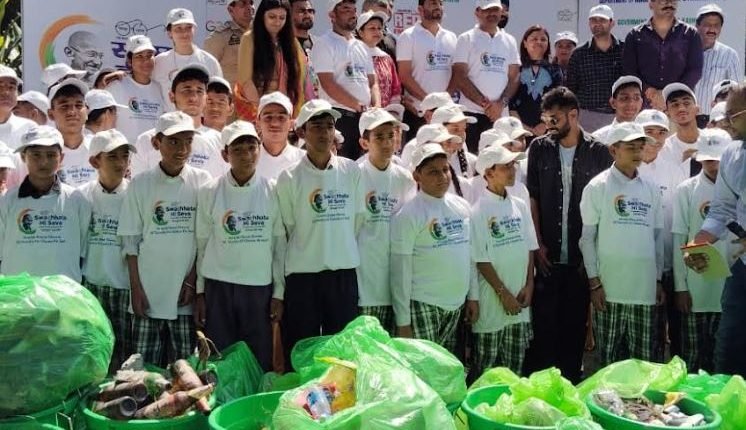Cleanliness, long regarded as a personal virtue, has in recent years transformed into a powerful collective movement transcending individual hygiene to encompass community well-being. The “Swachhata Hi Seva” (SHS) initiative, a nationwide mobilization led by the Indian government under the visionary guidance of Prime Minister Narendra Modi, stands at the forefront of this remarkable endeavor. Launched on October 2nd, the birthday of Mahatma Gandhi, the SHS campaign pays homage to the Father of the Nation, who advocated cleanliness as an essential element of his vision for a contemporary India. It encompasses our streets, neighborhoods, cities, and the entire country and goes well beyond the limitations of personal hygiene.
The SHS campaign has taken hold in a spectacular way in Jammu and Kashmir, a region renowned for its breathtaking scenery and tranquil beauty. It has evolved into a people’s movement that has welcomed the spirit of cleanliness with open arms. One of the most notable achievements in Jammu and Kashmir’s journey towards Swachhata has been the attainment of ODF PLUS (Open Defecation Free Plus) status for all its villages. ODF PLUS goes beyond merely constructing toilets and focuses on sustainable sanitation practices, efficient solid waste management, and the maintenance of cleanliness in public spaces. To achieve this milestone, it took the combined efforts of the government and its citizens. The administration worked tirelessly to build toilets, provide access to sanitation facilities, and manage solid waste effectively. Simultaneously, the people actively participated in cleanliness drives, adopted responsible waste disposal practices, and promoted awareness regarding the importance of cleanliness. This achievement highlights the region’s dedication to cleanliness and its commitment to building a cleaner and brighter future. Under the dynamic leadership of Lieutenant Governor Shri Manoj Sinha, the Swachhata movement in Jammu and Kashmir has evolved beyond a government-driven initiative into a Jan-Andolan, a people’s movement. The campaign now represents a chance for the residents of the area to embrace good change and actively participate in the transformation of their neighbourhoods. It is no longer simply about cleanliness. The active participation of residents from all walks of life in the SHS campaign in Jammu and Kashmir is a notable feature. “Shramdaan,” or voluntary labour, has gained prominence as people come together to clean public spaces, including lakes, rivers, and parks.
Engaging in this endeavor not only promotes physical hygiene but also nurtures a sense of accountability and dedication among the populace. It cultivates a culture where cleanliness isn’t solely a governmental directive but a collaborative endeavor and a civic duty towards both the community and the nation. The Swachhagrahis, influenced by the ideals of Mahatma Gandhi, have arisen as catalysts for transformation in the quest for cleanliness and hygiene. These individuals actively engage in cleanliness drives, conduct awareness programs, and motivate fellow citizens to join the Swachhata movement. The Swachhagrahis embody the spirit of selfless service, demonstrating how each individual can contribute to building a cleaner and better society. Their dedication and commitment serve as an inspiration, emphasizing that change begins with personal responsibility. The impact of the Swachhata Hi Seva campaign in Jammu and Kashmir extends beyond immediate benefits such as improved hygiene and sanitation. Cleanliness has led to better waste management practices, reduced pollution, and the conservation of natural resources. A cleaner environment attracts tourists and investors, boosting the region’s economy and providing new livelihood opportunities. Cleanliness, therefore, becomes a catalyst for holistic development, aligning with the vision of a prosperous Jammu and Kashmir. Education and awareness have played pivotal roles in driving the success of the Swachhata Hi Seva campaign. Educational institutions have actively participated in cleanliness drives and incorporated lessons on hygiene and sanitation into their curricula. Awareness campaigns have been conducted through various mediums, including social media, radio, and community outreach programs, disseminating information and encouraging behavioral change. Looking ahead, it is essential to consolidate the achievements made thus far. This includes maintaining ODF PLUS status, ensuring the sustainability of sanitation facilities, and continuing cleanliness drives. While infrastructure development is crucial, the focus should also be on fostering long-term behavioral change. Encouraging responsible waste disposal, promoting hygiene practices, and instilling a sense of cleanliness as a way of life should remain a priority. Community participation should continue to be encouraged and facilitated. Engaging with communities, recognizing and rewarding cleanliness champions, and involving local leaders can help sustain the Swachhata movement. Embracing innovative solutions and technology can enhance waste management, sanitation, and cleanliness efforts. From waste segregation apps to smart bins, technology can play a significant role in maintaining cleanliness. Educational institutions should continue to integrate cleanliness and hygiene into their curricula. Awareness campaigns should evolve to address emerging challenges and reinforce the importance of cleanliness. Furthermore, the Swachhata Hi Seva campaign should align with environmental sustainability goals. Efforts to reduce plastic waste, conserve water, and protect natural resources should be integrated into cleanliness initiatives. Not only is a campaign, cleanliness a revolution, a change that starts with each person. The entire nation is inspired by Jammu & Kashmir’s progress towards a more pristine and promising future. Mahatma Gandhi once said, “Be the change that you wish to see in the world.” The people have a strong connection to this message, and their efforts to create a better future for their region serve as an example for the entire country.
In short, it signifies a revolution and a transformation that each one of us can actively contribute to. It serves as a poignant reminder that together, we can propel India towards greater prosperity, improved health, and enhanced cleanliness. The Swachhata movement must continue to grow, adapt, and address new issues while embracing cutting-edge solutions. Every citizen must continue to deeply internalize this message, which serves as a constant reminder that maintaining cleanliness is not just a duty to the country but also a way of life.
#SwachhataHiSeva #CleanIndia #JammuAndKashmir #Swachhagrahis #CleanlinessMovement #SustainableSanitation #EducationForCleanliness #TechForCleanIndia #GandhiLegacy #BeTheChange #CleanlinessIsLife #EnvironmentalSustainability #CleanIndiaCampaign #CommunityCleanliness #ProsperousIndia




